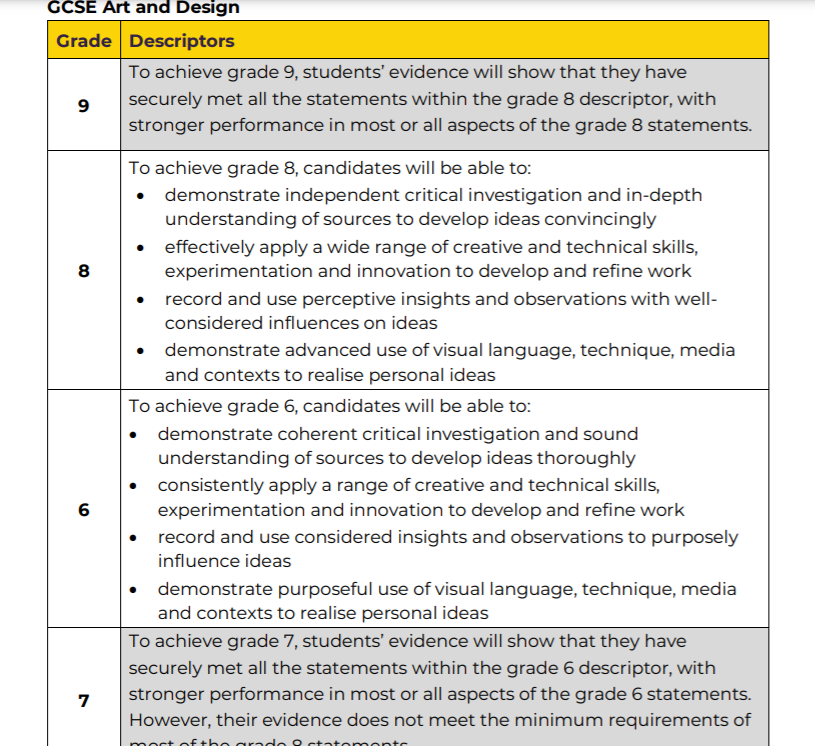GCSEs 2021: Teachers mock ‘hilarious’ grade descriptors

Teachers have taken to social media to brand new grade descriptors issued by exam boards as “hilarious” as well as unhelpful.
The descriptors were issued by the Joint Council for Qualifications (JCQ) this week, as a guide for how teachers should award overall A-level and GCSE grades when marking evidence of students’ work this year.
GCSEs 2021: Exam board grade guidance finally released
GCSEs 2021: Teachers to be ‘lambasted’ over grading
GCSEs 2021: How to make grading work
Teachers had compared the wait for JCQ’s guidance to Samuel Beckett’s existential drama Waiting for Godot, but now it has arrived, they are questioning how useful it is.
Head of geography Mark Enser described the descriptors for his subject as “hilarious” and asked how anyone would use them.
The descriptor for grade 9 at GCSE says: “To achieve grade 9, students’ evidence will show that they have securely met all the statements within the grade 8 descriptor, with stronger performance in most or all aspects of the grade 8 statements.”
The JCQ Grade Descriptors for geography are hilarious. Why did they bother to publish them?
- Mark Enser ? (@EnserMark) March 26, 2021
How on earth would anyone use them? pic.twitter.com/TPnIHl3tgR
He added that the “distinctions between categories are so vague and undefinable as to be meaningless”.
Another teacher commented that “at least they got 1-9 in the right order there...”, referring to how the descriptors for art and design grade 6 and 7 were not.
At least they got 1-9 in the right order there... pic.twitter.com/6M70WX80Ar
- Matt (@MatsMusings) March 27, 2021

Another teacher said they would use the grade descriptors’ vagueness to their advantage.
“Useless or totally useful - all my TAGs [teacher assessed grades] will be easily signposted to these meaningless descriptors in a fuzzy way. So all my final judgments will be correct - great!” they said.
The popular “distracted boyfriend” meme makes an appearance, too, with physics teacher Louie Evans comparing JCQ’s drift away from “sensible choices” to the “2008 national curriculum level descriptors” in its exams guidance.
- Louie Evans (@mrlouieevans) March 26, 2021
Another teacher said the descriptors brought back “horrific memories of [national curriculum] sub-levels and one school I worked at, where we had sub-sub-levels”. “I think those moderation meetings were the lowest points of my career” - referring to national curriculum levels for key stages 2 and 3, which were scrapped under then education secretary Michael Gove.
And teacher James Woodcock compiled a tongue-in-cheek guide to the grades, in which a grade 9 is “better than an 8”, a 5 is “good enough”, a U is “nothing” and a 1 is “better than nothing”.
If it helps people, I’ve done a quick guide to the grade descriptors. You’re welcome.
- James Woodcock (@JamesVWoodcock) March 26, 2021
9: Better then an 8
8: Not as good as a 9
7: Neither an 8 nor a 6
6: Could be better
5: Good enough
4: Not bad
3: Not good enough
2: Something
1: Better than nothing
U: Nothing
Others compared the descriptors to holding one’s finger in the wind or using a dartboard blindfolded.
Fixed it! pic.twitter.com/qKyWiF8gs4
- Mike, Token Shepherd (@MTBMike79) March 27, 2021
??? pic.twitter.com/vBXWNRGXGq
- GrahamGeog (@GrahamGeog) March 27, 2021
And English teacher Kaley Riley said: “To get a 9, you need to do things for an 8 but a bit better, innit.”
To get a 9, you need to do things for an 8 but a bit better, innit.???? pic.twitter.com/bFGNKfKsTt
- Kaley Riley (previously @MrsRileyEng) (@HoDandHeart) March 26, 2021
Another said: “I think they [JCQ] got a bit bored towards the end and gave up. I give grade 3 for writing “some attempt to engage with the task and the reader”.”
It’s the 7 that keeps making me laugh... “well, better than a 6, but not as good as an 8, obvs” ?♀️
- Miss Spencer (@MissSpencerDT) March 26, 2021
Loving the English mark scheme. Why bother giving a detailed descriptor for each grade?
- Rebecca Lee (@TLPMrsL) March 26, 2021
‘Just all of the below and some!’ #TeamEnglish @Team_English1 pic.twitter.com/8Bav82DzRL
But while some teachers parodied the descriptors, others commented that “contradictions” in the guidance meant consistency between schools would be “impossible”.
Hertfordshire deputy head Jonathan Mountstevens said: “When we look at the grade descriptors, they show all the usual problems of a best-fit approach to assessment. In history GCSE, for example, as a subject specialist, I don’t know the difference between these features of grades 6 and 8, such as ‘comprehensive’ and ‘broad’ knowledge.”
He pointed out that it was likely the evidence used by teachers for each student might encompass many grades, but that the guidance said teachers could not use a “formulaic” calculation to create a grade from different marks.
However, this must not be done through a ‘formulaic calculation’. But a formula with weighting is the only way to consistently balance the value of different sources of evidence. Otherwise teachers within the same centre will apply different standards and we lose consistency. pic.twitter.com/58fHWZWdGJ
- Jonathan Mountstevens (@MrMountstevens) March 28, 2021
“It is meaningless to exhort [schools] to be consistent and objective without giving them the means to do so. It’s like telling somebody to drive at the speed limit without a speedometer. Inconsistency comes just because teachers are individuals, not because they are unethical,” he added.
A JCQ spokesperson said: “The grade descriptors and their format have been produced through consultation between JCQ, the exam boards, the Department for Education, Ofqual and teaching associations. They are there to support centres in making holistic, consistent and fair judgements, based on a range of evidence, without being overly prescriptive.
“They are part of a wider support package which includes the full guidance, upcoming grading exemplifications and other documents, to support and inform centre policy and its consistent implementation. We will continue to support the teaching community and centre staff with summer 2021 grading throughout the coming months.”
You need a Tes subscription to read this article
Subscribe now to read this article and get other subscriber-only content:
- Unlimited access to all Tes magazine content
- Exclusive subscriber-only stories
- Award-winning email newsletters
Already a subscriber? Log in
You need a subscription to read this article
Subscribe now to read this article and get other subscriber-only content, including:
- Unlimited access to all Tes magazine content
- Exclusive subscriber-only stories
- Award-winning email newsletters
topics in this article



